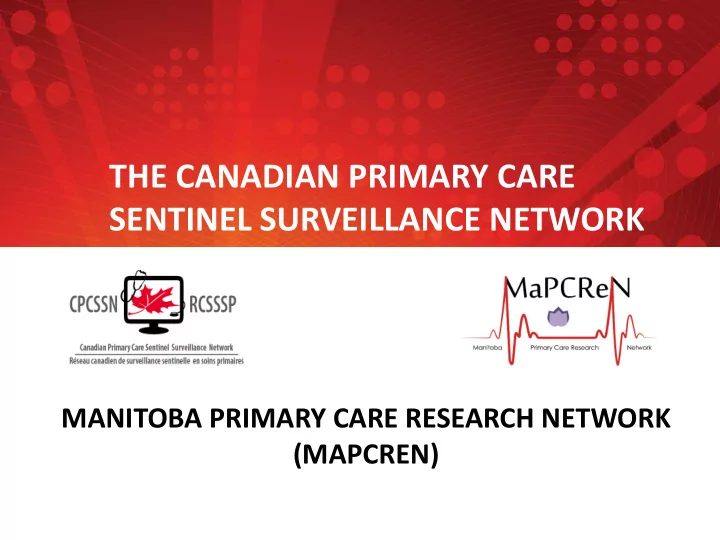

THE CANADIAN PRIMARY CARE SENTINEL SURVEILLANCE NETWORK MANITOBA PRIMARY CARE RESEARCH NETWORK (MAPCREN)
What is CPCSSN? How can you get involved? • CPCSSN - C anadian P rimary C are S entinel S urveillance N etwork • The first pan-Canadian primary care based multi-disease surveillance system • Collaboration of Clinicians and Researchers • A network of networks securely collecting health information from Electronic Medical Records (EMRs) in the offices of primary care providers since 2008.
What is CPCSSN? How can you get involved? 11 Primary-Care Based Research Networks across Canada 7 Provinces, 1 Territory 11 distinct EMR systems MaPCReN is Manitoba’s network in the CPCSSN
What is CPCSSN? How can you get involved? Sites Sentinels Patients CPCSSN 217 1,189 1,500,000+ MaPCReN 48 266 288,000+ As of Nov. 21, 2017 • Each local CPCSSN network recruits local primary care providers who consent to extraction of data from their EMRs. • MaPCReN (Manitoba Primary Care Research Network) currently extracting EMR data from practices utilizing Accuro o and JonokeMed
Purpose of CPCSSN How can you get involved? A research ready data repository for primary care investigators o Collect and maintain national epidemiological surveillance data to improve outcomes in health care o Improve management of conditions; best possible patient care o Develop reports for providers o Platform for multi-level research
Initial Focus How can you get involved? Initial focus: • 5 chronic health conditions Hypertension, Osteoarthritis, Diabetes, COPD, Depression • 3 neurologic conditions Dementia, Epilepsy, Parkinson’s Disease Any condition with indicators captured in a primary care EMR can be studied
Process How can you get involved? DE-IDENTIFICATION Patient records de-identified – assigned unique CPCSSN identifier. Key file generated permits linkage of patient’s EMR specific identifier with CPCSSN-generated unique identifier.
Process How can you get involved? Assigning of Unique CPCSSN Identifiers – Example: Provider Jane Doe CPCSSN- Provider generated 33425 Unique #897 Identifier Best Care Clinic Patients: John Smith CPCSSN- Patient generated 189756 Unique # 459728 Identifier Best Care Clinic
Process How can you get involved? CPCSSN Data Extraction occurs quarterly Data upload generated by MaPCReN Data Manager / your EMR Provider representative Data uploaded from EMR to secure regional CPCSSN server within CPCSSN server (no other CPCSSN personnel have access)
Process How can you get involved? Data Storage Site 1 Site 1 EMR3 EMR1 Site 2 Site 2 EMR2 EMR1 Network Network CPCSSN 1 3 Repository Site 3 Site 3 EMR5 EMR2 Site 4 Site 4 EMR5 EMR2 Network 2 Site 1 Site 4 EMR3 EMR4 Site 2 Site 3 EMR 3 EMR4
Repository Data How can you get involved? • Provider profile • Patient socio-demographics • Disease / health condition • Encounters • Risk factors • Examinations • Medications • Laboratory results • Referrals • Procedures
Access How can you get involved? Who has access to CPCSSN data? For what purpose? Those working with the central repository • Internal CPCSSN personnel – epidemiologists • Researchers who apply for access to CPCSSN data • Only data fields relevant to specific study – All patient data is de-identified
Ethics, Privacy, and Security How can you get involved? CPCSSN - national ethics approval Health Canada MaPCReN - local ethics approval University of Manitoba WRHA Southern RHA Northern RHA
Ethics, Privacy, and Security How can you get involved? • CPCSSN privacy committee - oversees privacy and confidentiality policies and their maintenance • Patient consent not individually obtained; patients informed of opportunity to • opt out and have their data excluded. consistent with PHIA legislation in MB. •
Why participate? How can you get involved? • Your voluntary participation will significantly enhance our capacity to do local primary care research • Allows for national primary care research • Enables us to provide you with practice profile reports to help you understand your practice and to compare with others…..
Value proposition – sample report How can you get involved? Reports to You: As part of the quarterly data processing CPCSSN will • generate sentinel feedback reports. Reports contain aggregated data for each sentinel provider • patient demographic makeup – disease prevalence and indicators – Compare disease rates for patients in practice to those of clinic / region / other CPCSSN sites across the country
Feedback Reports (sample) How can you get involved?
Feedback Reports (sample) How can you get involved?
Feedback Reports (sample) How can you get involved?
Feedback Reports (sample) How can you get involved?
Feedback Reports (sample) How can you get involved?
Feedback Reports (sample) How can you get involved?
Previous Research How can you get involved? Assessing the Quality of Oral Anticoagulant Therapy in Canadian Primary Care Practices: A retrospective study using the Canadian Primary Care Sentinel Surveillance Network (CPCSSN) Assessment of Outpatient Antimicrobial Prescribing in Manitoba Using a Primary Care Sentinel Surveillance System
Sentinel Participation How can you get involved? Meet MaPCReN Network Director and/or Research Staff. Each provider completes and signs the Research Participant Information and Consent forms. Complete the Clinic Data Sharing Agreement and Clinic Profile Form. Site Manager to collect above forms from participating providers at your clinic and return to MaPCReN.
Contact Us How can you get involved? Manitoba Primary Care Research Network (MaPCReN) D009 – 780 Bannatyne Avenue Winnipeg MB R3T 2N2 • Alex Singer, Network Director asinger@sbgh.mb.ca • William Peeler, Data Manager William.Peeler@umanitoba.ca • Leanne Kosowan, Research Coordinator Leanne.Kosowan@umanitoba.ca • Alyzia Horsfall, Research Assist ant Alyzia.horsfall@umanitoba.ca
How can you get involved?
Thanks to all Funders, Stakeholders, Partners AND Sentinel Clinicians! Funding for this publication was provided by the Public Health Agency of Canada The views expressed herein do not necessarily represent the views of the Public Health Agency of Canada. Cette publication a été réalisée grâce au financement de l'Agence de la santé publique du Canada. Les opinions exprimées ici ne reflètent pas nécessairement celles de l'Agence de la santé publique du Canada.
Recommend
More recommend